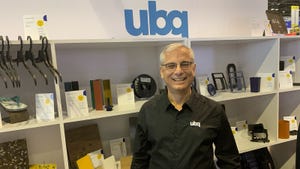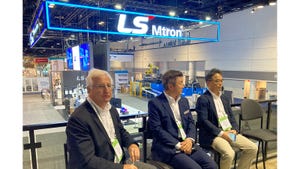A 21st-century resin purchasing strategy
June 1, 2005
Managing resin costs in today''s volatile pricing environment is critical to profitability, and Bill Bowie is committed to helping molders get a handle on purchasing strategies to get the best price.
We are in the business of helping molding companies lower their costs," Bowie says. "We just want a fair price-not the lowest price, but the best price for your business." Currently COO of Resin Technology Inc. (RTi), a resin purchasing consulting firm in Fort Worth, TX, Bowie took what he learned at his first job in the film industry, where resin was looked at very closely, and applied that focus to the injection molding industry, "where they often don''t look at resin as closely as they should." Bowie adds that "high resin prices have changed things for molders, where 25% to 30% of the cost to manufacture is in material."
Resin is a major key to profitability for all processors, yet it is an area in which adept purchasing skills are sometimes lacking. Also, there are new rules in the molding game and many molders say they can no longer add that 5% or 10% markup on the materials to help buffer scrap miscalculations. OEMs are becoming wise about pricing, so skillful purchasing-including purchasing the right materials at the right price-along with choosing the right equipment for materials handling is critical for processors.
"The biggest disappointment I have is that most [molders] still don''t get it," Bowie says. "It''s interesting because a company like Nypro stands head and shoulders above the others-they get it: You can''t make money opening and closing metal plates. You have to bring value."
Bowie acknowledges that dealing with resin price increases has a lot of molders pulling out their hair, but he believes there is a way to cope. "Create a culture that embraces change and see the opportunities in change," he says, offering processors his 10 Rules for Buying Resin.
1. Develop a culture of discipline
"This speaks to identifying the things that you do well and focusing on these to create a culture that has certain expectations," Bowie says. "Identify the things you don''t do well and follow through to make those better."
2. Negotiate from your strengths and use knowledge as a weapon
"This is where resin technology fills a void for processors," Bowie says. "So often when we go to a meeting with a resin supplier, they''re coming in with all these facts they lay out about why costs are going up. Processors need to be just as prepared with facts of their own.
"It''s not enough to scream that you want a lower price-know why you want a lower price."
3. Build on your network and education
"Talk to all the resin people, the machinery suppliers, the guys you meet at conferences, stay up on the industry, and don''t shut anyone out," Bowie emphasizes. "Too many times, purchasing talks to the three suppliers they usually deal with, and say, `Here''s the price I need, what can you do?'' It''s just as important to talk to the suppliers you don''t buy from as the ones you do buy from."
4. Harness the power of change
"I call this `Pattern Interrupt,''" says Bowie. "Predictability is your enemy. The salesperson calls on purchasing the third Wednesday of every month. They go to lunch at their favorite restaurant. Purchasing gives the sales person an order and they part ways.
Bowie''s suggestion? "Next time, let the president talk to the salesperson. Things aren''t as comfortable as they were the last time. Then have the VP of sales stick their head in the door and talk to the resin salesperson. Change that comfort zone the supplier''s representative has gotten into."
5. Control the communication and consolidate all information
"Develop strategies around your resin purchasing that stay internal to your business," Bowie stresses.
"Again, custom molders are the worst at strategizing. They qualify a variety of resins for a variety of customers, but don''t know that there are some things that stay internal to the company. Have defined rules as to what the engineer or purchasing person can or cannot talk about to a resin supplier."
6. Expand your box
"Be a learner organization, not a judger [sic] organization," Bowie advises. "Identify real barriers versus perceived barriers. The learner says, `Maybe we should try this, it might work,'' while the judger says, `We tried that and it won''t work.'' Over time, an organization builds these perceived barriers, until someone like RTi comes in and shows them new ways, new ideas for changing resins and getting out of the box."
7. Simplify and leverage
"Talk to many, buy from a few," says Bowie. "Many times products are over-engineered and resins are overly complex; like requiring antistat in a part where perhaps it''s not needed. Ask yourself, `Is this business more complicated than it needs to be?'' and spend time simplifying the resin buying process."
8. Be low maintenance
"Find ways to make the resin suppliers'' lives easy," Bowie states. "Why be difficult? This leads to the next rule-the guy who sits across the table from you [the resin salesperson] isn''t the one who sets your price. Return phone calls."
9. Develop an advocate
"Find someone in every supplier organization who will be an advocate for you," Bowie states. "Give him the facts, take the emotion out of it, empower him with the information that he can take back to his superiors and go to bat for you. They''re in business to sell resin and they like to sell to good companies-i.e., the ones who pay on time."
10. Pay on time
"If you need 60 days, negotiate for 60 and pay in 59," Bowie advises. "You''ll get more consideration for good pricing."
A case in point
Wisconsin Film and Bag (WIFB), near Green Bay, WI, custom manufactures about 15,000 types of PE bags and sheeting products annually. Growth has been steady since the company''s founding in 1970, and WIFB has added six new extrusion lines since 1993, including a new line installed in March of this year. The company also installed a new, larger repelletizer to reprocess not only its own scrap but also clean, unprinted PE scrap purchased as post-industrial material.
"Because we always customize our formulations to meet a customer''s exact needs, it is critical that all our people understand the total process as well as be experts in their primary job," says Jack Riopelle, president of WIFB. "Everything is custom. No stock. We''re a custom provider of film and bags, primarily bags, for wrapping mattresses, windows, food products such as cheese, and liners for cardboard boxes." Other products are designed for form, fill, and seal applications.
Recently the company has provided bags to a dairy for shipping milk. "We developed a monolayer bag using a linear low-density PE blend which had to be very strong and had to resolve the other maker''s deficiencies," Riopelle explains. Another new application for medical has achieved pharmaceutical certification.
Riopelle notes that WIFB still had one major problem: Controlling the cost of raw materials. And never has that been more critical. "The materials a processor chooses and the price they pay can propel or sideline a business," notes Jim Morris, managing partner of RTi. "As resin producers continue to test the upper limits of pricing-in 2004, PE was up 50% for some grades-processors need to learn to successfully manage in that environment. It boils down to resin management."
When RTi was first called into WIFB''s facility in 2001, the first thing Rti did was conduct an audit of needs in order to formulate a plan that would tightly manage WIFB''s resin purchases. WIFB continually uses RTi''s real-time benchmark database of pricing and supply.
RTi''s website provides WIFB with custom-tailored news, data, charts, and industry trend analysis that enable the company to make better buying decisions. Riopelle says, "We''ll always keep our customers one step ahead as long as we buy right. Resin Technology helps us identify the right raw materials, color concentrates, additives and scrap, and helps us purchase them at the proper price."
Morris says, "It''s important to select the most favorable products and buy them at the best possible price. It''s also important to have an unbiased professional resource to help anticipate future prices, and pinpoint the best time to take the finished product increases to the market. "
Put simply, Riopelle says, "We find RTi keeps focused on the resin portion of our business so we can concentrate on our customers."
Clare Goldsberry [email protected]
Contact information
Resin Technology Inc. |
You May Also Like


